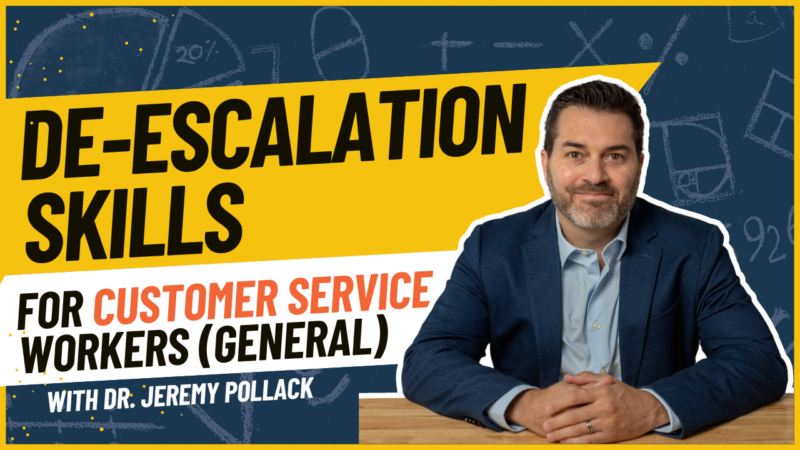Table of content
It is not your fault when someone yells at you. A person raises his or her voice because he or she may lack proper coping skills or have a sensitive core emotional psyche. The best way to get out of the situation is to stay calm and realize that, even though the other person never learned proper coping behaviors, you are the more emotionally mature person in this situation.
Deep breathing and remaining calm will not, by themselves, solve the problem, but yelling definitely will not either. Your ability to remain calm will get you out of the immediate situation, and after everyone has had some time to calm down, it will allow you to think about how to solve the problem, if it is even your responsibility to solve it in the first place.
Yelling Is a No Win Situation, but You Can’t Lose When You Stay Calm
When people raise their voices or behave in an aggressive manner, they know that it is not an effective way to communicate. People yell because they have poor coping skills or, even if they are usually able to respond appropriately to stressful situations, their emotions have gotten the better of them this time.
Emotional instability loves company, and when someone yells, he or she is trying to get you to engage with their negative emotions. If you can temporarily override your brain’s reward or punishment system and look at the big picture in the situation, you can resolve the underlying conflict, or at least learn how to address future unpleasant interactions with that person.
Why Yelling Is Counterproductive
No one has ever resolved a conflict by yelling. At best, yelling makes someone not want to interact with them.
Yelling is effective if you are trying to pick a fight because it encourages future yelling and other negative responses. When you yell your message, other people hear the yelling, but they don’t hear the message. If you are constantly yelling, people will either avoid you, or they will tune out the raised voices.
If you can remain calm enough to stop yelling, you can improve your self-esteem and your interpersonal relationships.
Your own yelling affects you at least as much as it affects you when someone is shouting at you. You might feel a yelling episode coming on and feel like you are going to explode, but once you start shouting, it is not easy to stop. You might think that you are trying to make the recipient react correctly when, in fact, any possible response from the recipient could make you want to continue yelling.
What Does It Feel Like When a Person Yells at You?
People naturally feel threatened by loud noises. Even the most courageous or even-tempered people find it disturbing when someone else yells at them. The sound of someone yelling at you sets off your fight-or-flight response.
The natural reaction to yelling is your own emotional outburst or emotional shutdown. Even if you know what you want to say in response, the loud and threatening tone of voice can make you yell in response, say things you don’t mean to get the other person to stop shouting, or it can make you “play possum” where you are unable to say anything at all in response.

Why Do Some People Have Such a Hard Time Remaining Calm?
You probably know some short-tempered people, and you probably do not enjoy their company. If you are not the target of the outbursts, it might even be funny that your coworker sometimes starts yelling mid-sentence in much the way that characters in Broadway musicals spontaneously break into song. For various reasons, some people have not learned to pause mentally and assess the situation before they lose their tempers.
Psychological Reasons Why People Yell
If you can empathize in the moment with someone shouting at you, it means that you are very emotionally intelligent. Yelling is a learned behavior, just as you can learn to avoid yelling.
The short answer is that people yell because they are angry and frustrated, or because they feel deeply sad about something unrelated to the present situation, and the problem that set them off is not the real issue. Each person’s core psyche has the propensity both for empathy and for aggression, so why is it that, in the same situation, someone is shouting while someone else appears calm?
Yelling Is Usually a Sign of Deeper Dysfunction
As for why some people resort to displaying emotional tyranny as their go-to coping mechanism, one of the reasons could be because their parents yelled at them whenever they were angry so it was a learned response.
Parents who yell know that yelling scares children; perhaps they yell because their parents acted on their aggressive tendencies with physical abuse, so yelling has become the go-to reaction in the next generation because it seems like the lesser of two evils. Most bullies have been targets of bullying themselves, and when feeling threatened bullies tend to go into bully mode.
The good news is that it is possible to break the cycle of yelling. Even the most hot-tempered person can build the habit of using calming techniques to gain control of the situation before losing his or her temper.
The problem usually does not solve itself overnight, unless you hear a recording of a person shouting for a trivial reason and then realize that the person is you. Most of us require anger management classes, mental health counseling, or simply a lot of practice to learn to take deep breaths and speak in a calm tone even when you are angry.
How to React When Someone Yells at You in the Workplace
When an impatient driver yells at you, it is easy enough to take a deep breath, acknowledge that you are not the problem, and zoom away, leaving the person immediately in the dust as soon as the light turns green.

Maybe the neighbor who comes out of his house and yells whenever children or dogs set foot on his lawn was emotionally abused as a child, or maybe he is just a jerk, but you know that it is not about getting into a physical confrontation. You can walk away from a casual acquaintance or get into a physical fight with a stranger, but these reactions are not appropriate in a work setting.
Work is also not the place to wax poetic about bridging the emotional chasm between you and the other person like you would do with your spouse or a close friend. It takes skill to muster a positive reaction when someone is yelling at you while you are at work trying to earn your daily bread.
Dealing With a Short-Tempered Boss
Dealing with your boss yelling at you is one of the most stressful situations that can happen to you at work. First, it is usually a sign of deeper problems in your workplace. When someone is yelling, that person has lost control, so even if you calmly addressed the immediate situation, it would not solve the underlying problem.
In a family or in-law relationship, it is entirely acceptable to tell people that they are being unreasonable when they are yelling, but when your boss yells, you should calmly address the problem without acting defensively or constantly repeating yourself.
If the person engages in aggressive behavior frequently, or if your supervisor’s angry outbursts are a constant occurrence, you should talk to another manager at your workplace about the problem.
Yelling in the workplace is a sign of a hostile work environment, and hostile work environments are rarely resolved by talking to the aggressive person directly about the problem. Complaining about a hostile work environment is a legally protected activity, and your employer cannot legally retaliate against you for complaining.
The Yell-Proof Customer Service Representative
Dealing with angry customers on the phone is a thankless job, but many of us depend on customer support jobs for our income. Whenever conflicts arise with customers, you are the one who has to hear about them.
The good news is that a heated conversation with a customer cannot escalate into a physical altercation. The bad news is that you cannot simply walk away from a phone conversation that it is your job to have. You must spend a few minutes continually repeating yourself in calm tones while the irate customer rants and raves about a problem that you did not cause and may or may not be able to solve.
Not taking things personally is just the beginning. If you truly cannot stand having a particular customer yell at you anymore, you can transfer the call to someone who might be able to help, or at least someone whose calm voice has more of an effect on the belligerent customer than yours does.
Make sure to tell the customer that you are trying to help and that the person you are transferring the call to can help with problems X, Y, and Z. This way, the customer will not think that you are just trying to get rid of him or her so that the next customer service representative picks up the phone to find the customer even angrier than before.

De Escalation in the Workplace Begins Before the Yelling Starts
It is not your job to stop other people from yelling and to avoid provoking the anger of hotheads, blowhards, and people with hair-trigger tempers. It is, however, your job to deal with customer complaints, direct traffic, teach eighth graders to factor polynomials or do whatever your employment contract requires you to do, and people might yell at you while you are trying to do your job. The more strategies you have planned out before you get into a tense situation, the easier it is to resist the very human urge to fight or flee.
Sometimes the best way to stop someone from yelling at you is to persuade them to pause their yelling temporarily. You can promise to talk about the problem at a later time when you are both thinking clearer. When that time comes, you may have found that the anger has blown over, and the person with the grievance is ready to focus on solutions. In other words, being knowledgeable about conflict management is one of your best defenses against yelling, regardless of the industry in which you work.
Defuse De Escalation Training Can Make Your Workplace More Peaceful
De escalation is not an inborn talent but rather a skill that anyone can learn. If you are in a managerial role, then being able to de-escalate conflicts is an important component of your success.
Defuse De-Escalation training offers coaching and workshops on de-escalation and conflict management in the workplace. Contact Defuse today to find out more about dealing with other people’s anger at your job.




